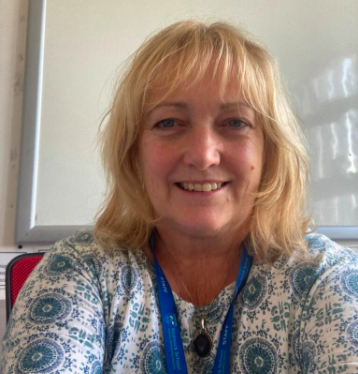Gloucestershire Dyslexia Association

Wendy Hawkins
Stroud, Tutoring and assessing primary and secondary children.
I am a primary trained teacher with 30 years of teaching experience. For 15 of those years I was a primary SENCo (special education needs coordinator).
I completed the 2 years of my post-graduate training for dyslexia in 2007 and hold the relevant qualifications for both teaching and assessing dyslexic individuals.
I am now a part-time Support Teacher at a local secondary school, alongside private tutoring and assessing. I am a volunteer trustee for Gloucestershire Dyslexia Association. The students I teach privately range from 8 to 15 years. I am also trained as a Forest School Leader, but sadly have not had the opportunity to work within this field for a long time but try to bring the ethos into my dyslexia work.
Presently not accepting further bookings for assessments.

Dr Georgia Niolaki Accredited Member of the British Dyslexia Association (AMBDA)
E: Georgia.niolaki@gmail.com
Assessment for children and adults.

Dr Elsa Suckle
website: neurodiversityspace.com
I am a specialist dyslexia, autism, and ADHD practitioner and specialist assessor for dyslexia and ADHD. I am passionate about putting the right support in place for neurodivergent students and guiding people to better understand how they work best and how to capitalise on that. I have a Level 7 qualification in Language, Literacy and Dyslexia from the University of Birmingham and I am an associate member of the BDA, a professional member of Patoss, and hold a current APC.
I currently offer dyslexia diagnostic assessments for the age group 12-24 which focus on educational recommendations. I also have substantial experience working with apprenticeship learners. I can offer SpLD assessments for ADHD for educational purposes to put Disabled Students Allowance in place in line with SASC guidelines. This applies to the age group 17-24.
It can be daunting seeking a diagnosis, so please feel free to reach out to me for further information and a friendly chat.

Marion Craven
E: marion@overcomingbarriers.co.uk
Dyslexia and Dyscalculia Assessor and Teacher for primary age children around the Cotswolds and Gloucestershire
Marion is a bright dyslexic who has personal experience and empathy of a challenging school and university life. Through her courses, teaching dyslexics in primary schools and taking part in a two-year BDA Sound Check project (2013-2015), she has explored and developed strategies for herself and applied them successfully to her teaching and assessment recommendations. She strives to help primary age children understand and overcome their barriers in life-skills and their literacy/numeracy to become independent learners.
Qualifications:

Bernadette Lee
I have worked for many years in a local prep school and live in Leckhampton. I have always had a special interest in dyslexia. I have taught many children who have presented with learning difficulties. Having specialized in literacy teaching for many years, I have much practical experience in the ways learning difficulties impact on a child’s progress and how to help.
Qualifications:
Contact details:
Services offered:

Claire Probert
Hi, my name is Claire and I am a qualified teacher with fifteen years experience. I am also a qualified SpLD/dyslexic assessor and a specialist 1-1 private tutor. I also teach in an independent, specialist school with children aged 10-16 with a range of learning difficulties.
I carry out diagnostic assessments for learners aged 7- 16. I hold an active APC and I am accredited by PATOSS.
As a dyslexic assessor I begin by collecting a range of background information from the family and school. The assessment identifies a profile of strengths and weaknesses and any learning difficulties/differences. The report will conclude with the assessment findings, including a diagnosis, if required, and provide recommendations for support at home, in school and Exam Access Arrangements.
Assessments are carried out in my purpose build office at my home in Bristol. I offer a friendly, understanding and supportive service for families and I am passionate about going that extra mile to help them.
I am able to immediately put your child at ease and really gain an insight into their learning profile to provide effective and useful recommendations for support at home and at school.
Please contact me in one of the following ways to find out more information:
Email- claire@strive-dyslexiaservices.co.uk
Website- https://www.strive-dyslexiaservices.co.uk
Telephone: 07813668320
Qualifications:
BEd (HONS) qualified teacher status- 2003
Level 5- Teaching children with SpLDs/dyslexia
Level 7- Assessing learns with SpLD/dyslexia.
WHAT TO EXPECT FROM ASSESSMENT
The assessment includes investigation into three different areas:
Having carried out assessment in the first two areas, it is possible to determine whether an individual is significantly underachieving in literacy / numeracy, compared with what would be expected when considering their underlying ability. The cognitive tests give an indication of whether any underachievement may be linked to difficulties within these areas of learning. The results are then viewed in relation to the definition of dyslexia (see below) and a conclusion is made as to whether the individual is dyslexic or not.
This testing can take up to 3 hours, depending on the age of the individual and the complexity of their needs. It can be managed in 1 or 2 sessions, with suitable breaks as needed. Parents may wish to stay with the young person but need to be aware that sometimes parents/carers are a distraction, and it can influence the young person’s behaviour or performance. Parents may want to bring something to keep themselves occupied or plan a time to return.
It is important for children to know that they are coming to see someone who is interested in how people learn. The assessment will help to work out why some learning is difficult and what might help to make things easier.
Background information from parents and school is extremely important in building up the individual’s ‘learning profile.’ Any diagnosis involves more than just test scores and must include developmental history. Therefore, both school and parents are asked to complete a questionnaire that is returned to the assessor at least 1 week before the assessment. Tests can then be tailored to the needs of the child. Children can bring examples of schoolwork and reports with them; a current reading book and a short piece of totally independent writing is also useful.
The child must have had a sight test within the last six months. If the child has glasses (prescription and / or tinted) or uses a coloured overly it is vital that they bring them with them to the assessment.
A visual questionnaire is also completed prior to the assessment. If this flags up possible issues, it is advisable to go to a suitably qualified optician for a Specific Reading Difficulties (SRD) assessment. This is different to the usual eye test and not all opticians offer it, but ‘Weygangs’ and some branches of Norville’s do in this area.
THE REPORT The structure of the assessment report is one that is recommended by the professional bodies that regulate qualified assessors of dyslexia – the British Dyslexia Association, BDA and the Professional Association for Teachers Of Students with SpLD, PATOSS. It can be up to 30 pages in length and provides details of the young person’s achievement in the tests, a learning profile that indicates whether dyslexia has been diagnosed or not, and recommendations for the future, including ‘signposting’ to other professionals if required. Legislation was passed in 2019, meaning that the report can last the educational lifetime of the individual concerned and no further full assessment will be needed, for example, when they progress onto further education. However, the assessor must have an up-to-date Assessment Practising Certificate (APC) from either the BDA or PATOSS for the report to be recognised for this purpose. This is renewed every 3 years. Definition of dyslexia: British Dyslexia Association 2007 ¨ Dyslexia is a specific learning difficulty that mainly affects the development of literacy and language related skills. ¨ It is likely to be present at birth and to be lifelong in its effects. ¨ It is characterised by difficulties with phonological processing, rapid naming, working memory, processing speed, and the automatic development of skills that may not match up to an individual’s other cognitive abilities. ¨ It tends to be resistant to conventional teaching methods, but its effects can be mitigated by appropriately specific intervention, including the application of information technology and supportive counselling. http://www.bdadyslexia.org.uk/about-dyslexia/faqs.html Definition of dyslexia: The Rose report 2009 ¨ A learning difficulty affecting accurate and fluent word-reading and spelling ¨ Difficulties in phonological awareness, verbal memory and verbal processing ¨ Dyslexia occurs across the range of intellectual abilities ¨ It is best thought of as a continuum, not a distinct category and there are no clear cut-off points ¨ Co-occurring difficultness may be seen in aspects of language, motor co-ordination, mental calculation, concentration and personal organisation, but these are not, by themselves, markers of dyslexia. ¨ A good indication of the severity and persistence of dyslexic difficulties can be gained by examining how the individual responds or has responded to well-founded intervention. COSTS. Assessment & full report includes time to talk through report with parents as needed. We have assessors connected to us see above, assessors can also be found on PATOSS website Patoss Tutor Index (patoss-dyslexia.org)
|